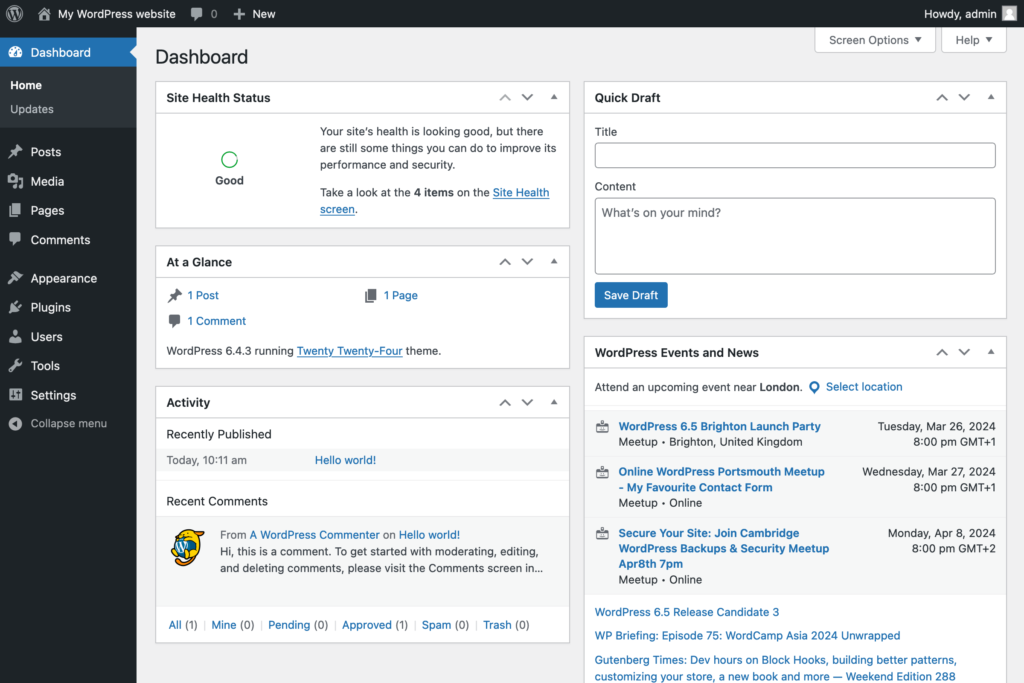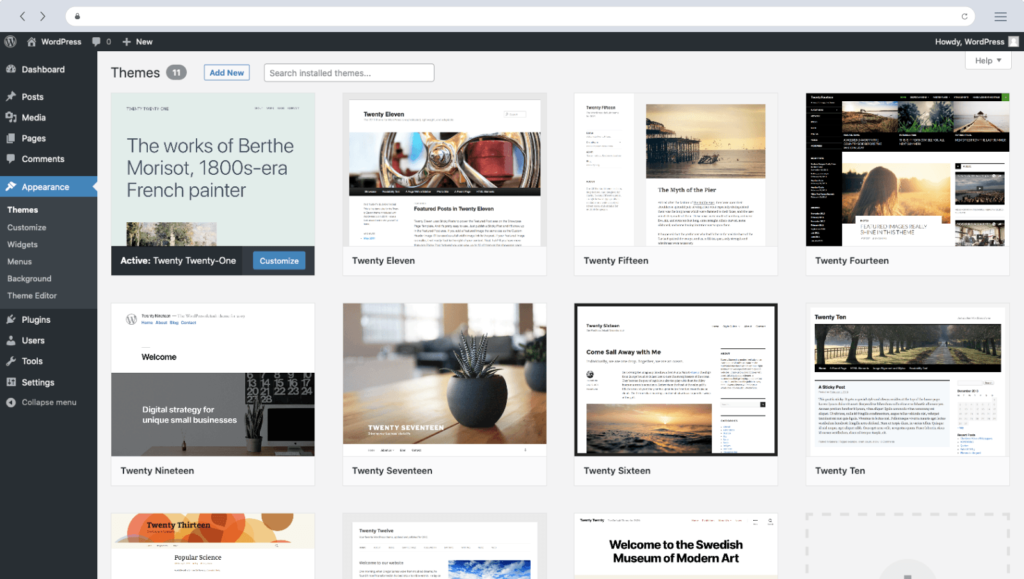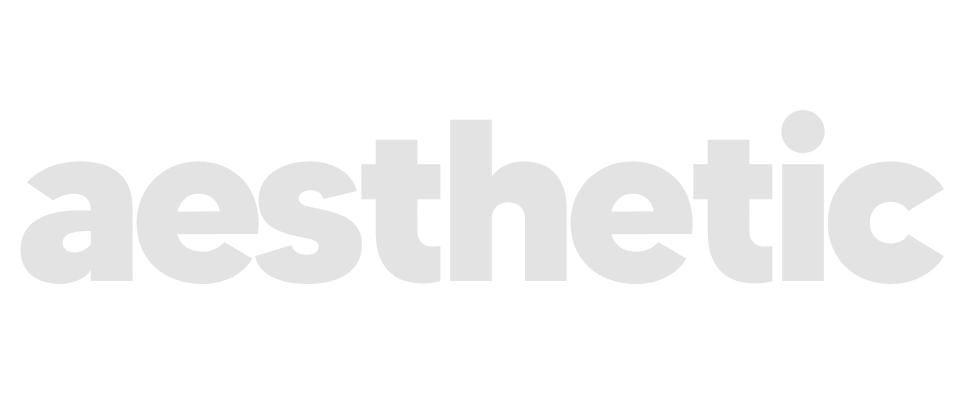Need help with the sheer number of website platforms available for your small business? That’s okay. Many small business owners like you want to establish a professional online presence but are deterred by the complexity and potential costs involved. You might be wondering if there’s a solution that’s both affordable and user-friendly. Enter WordPress – a platform that’s been powering websites for millions of businesses worldwide.
With years of experience in web development and a deep understanding of small business needs, WordPress is one of the best choices for small businesses. In this comprehensive review, you will discover why WordPress stands out as a versatile, cost-effective, and easy-to-use platform. By the end of this article, you’ll have a clear understanding of how WordPress can help you create a professional, affordable, and manageable website for your small business.
Let’s explore what makes WordPress the ideal platform for your small business website.

What is WordPress?
WordPress is a powerful and versatile content management system (CMS) that has become the go-to choice for millions of websites globally. Originally launched in 2003 as a blogging platform, WordPress has evolved significantly over the years. Today, it powers everything from personal blogs to complex corporate websites, e-commerce stores, and everything in between.
Key Features of WordPress:
1. User-Friendly Interface:
Do you need a developer for WordPress? The short answer is no – WordPress offers an intuitive dashboard that makes it easy for users, even those with minimal technical skills, to create and manage content. The interface is straightforward, with clear options for adding new posts, pages, and media.
2. Extensive Customisation:
One of the standout features of WordPress is its high level of customisation. With thousands of free and premium themes and plugins, you can tailor your website’s appearance and functionality to meet your specific needs. Whether you need a simple portfolio site or a robust online store, there’s a theme and a plugin for you.
3. SEO-Friendly:
WordPress is built with search engine optimisation (SEO) in mind. It generates clean, readable code, and there are numerous plugins available, like Yoast SEO, that help optimise your content for search engines, ensuring your site ranks higher in search results.
4. Mobile Responsiveness:
In today’s mobile-first world, having a mobile-responsive website is crucial. Most WordPress themes are designed to be responsive, meaning your site will look great on all devices, from desktops to smartphones.
5. Community Support:
WordPress boasts a large and active community. There are countless forums, tutorials, and resources available online, ensuring that help is always at hand when you encounter any issues or have questions.
6. Regular Updates and Security:
The WordPress development team regularly releases updates to improve functionality and security. This ensures that your website remains secure against the latest threats.
Why WordPress is Ideal for Small Business Websites
Choosing the right platform for your small business website is crucial, and WordPress offers several benefits that make it an excellent choice:
Is WordPress Free?
WordPress itself is free to use, though you will need to pay for hosting and possibly some premium themes or plugins. This makes it a budget-friendly option compared to many proprietary website builders.
Scalability:
As your business grows, your website can grow with it. WordPress is highly scalable, allowing you to add more features and functionality as needed without having to start from scratch.
Easy to Use:
WordPress is designed to be user-friendly, making it accessible even to those without technical expertise. With a bit of initial setup and some learning, you can manage and update your site with ease.
Customisation and Flexibility:
With the vast array of themes and plugins available, you can create a unique website that reflects your brand identity and meets your specific business needs.
SEO Capabilities:
SEO is vital for driving traffic to your website. WordPress’s SEO-friendly structure, combined with powerful plugins, helps ensure that your site is optimised for search engines, helping you attract more visitors.
Community and Support:
The extensive WordPress community means that support is always available. Whether you’re looking for tutorials, forums, or professional developers, you’ll find plenty of resources to help you along the way.
By leveraging these benefits, WordPress can help your small business establish a strong online presence, attract more customers, and grow effectively.
Customisation and Flexibility
How do you make a WordPress website? One of the standout features of WordPress is its extensive customisation options. No matter your business type or specific needs, WordPress can be tailored to create a unique and functional website.
Themes:
Variety:
WordPress offers thousands of themes, both free and premium, catering to different industries and aesthetic preferences. Whether you need a minimalist design for a personal blog, a professional look for a business site, or an eye-catching layout for a portfolio, there’s a theme for you.
Customisation Options:
Most themes come with customisation options that allow you to change colours, fonts, layouts, and other design elements. The WordPress customiser lets you preview these changes in real-time before applying them.
Child Themes:
For more advanced customisation, you can create a child theme. This allows you to modify an existing theme’s code without losing those changes when the theme is updated.
Plugins:
Extending Functionality:
Plugins are one of WordPress’s most powerful features. With over 50,000 plugins available, you can add virtually any functionality to your site, from contact forms and SEO tools to e-commerce capabilities and social media integrations.
Ease of Installation:
Installing plugins is easy and can be done directly from the WordPress dashboard. Once installed, plugins can be activated and configured with just a few clicks.
Popular Plugins:
Some of the most popular plugins include WooCommerce (for e-commerce), Yoast SEO (for search engine optimisation), and Elementor (a drag-and-drop page builder). These plugins enhance your site’s functionality and improve user experience.
Custom Development:
Themes and Plugins:
If you have specific needs that aren’t met by existing themes or plugins, you can hire a developer to create custom solutions. This ensures your website has all the features you need, exactly how you want them.
API Integration:
WordPress’s REST API allows for seamless integration with other software and services, enabling you to extend your site’s functionality and connect with external platforms.
WordPress’s customisation and flexibility mean that your website can grow and evolve with your business. Whether you’re starting with a simple site or planning for future expansions, WordPress can adapt to meet your needs.

Cost-Effectiveness
When considering a platform for your small business website, cost is a crucial factor. WordPress stands out as a cost-effective solution, offering flexibility and functionality without breaking the bank.
Initial Costs:
WordPress Software:
WordPress itself is free to download and use. This open-source platform allows you to build and manage your website without any initial software costs.
Domain and Hosting:
To get your website online, you’ll need to purchase a domain name and a hosting plan. Domain names typically cost around $10-$20 per year, while hosting plans can range from $3 to $30 per month, depending on the level of service and features you choose.
Themes and Plugins:
Free Themes and Plugins:
There are thousands of free themes and plugins available in the WordPress repository. These can provide all the essential features and design options you need to get started.
Premium Themes and Plugins:
For more advanced features and professional designs, you might consider investing in premium themes and plugins. Premium themes usually cost between $30 and $100, while premium plugins can range from $15 to $100, depending on their functionality.
Ongoing Costs:
Maintenance and Updates:
Regular maintenance is necessary to keep your WordPress site secure and running smoothly. This includes updating the WordPress core, themes, and plugins. While you can handle these updates yourself, you might opt for a maintenance service, which typically costs $50 to $150 per month.
Security:
Ensuring your site is secure is critical. While there are free security plugins available, you may choose a premium security solution for enhanced protection, costing around $50 to $100 per year.
Additional Services:
Depending on your needs, you might incur additional costs for services such as premium support, SEO optimisation tools, or custom development. These costs can vary widely based on the scope and complexity of the services required.
Comparison with Other Platforms
Proprietary Website Builders:
Many proprietary website builders, like Wix or Squarespace, charge monthly or annual fees that include hosting, domain registration, and access to their platform. While these services can be convenient, they often have higher ongoing costs and less flexibility compared to WordPress.
Custom-Built Websites:
Hiring a developer to build a custom website from scratch can be very expensive, with costs running into thousands of dollars. WordPress offers a more affordable alternative, with extensive customisation options that can be tailored to your specific needs without the high price tag.
By carefully selecting themes, plugins, and services, you can create a professional WordPress site that fits your budget. This cost-effectiveness, combined with the platform’s flexibility and power, makes WordPress an ideal choice for small business websites.
Security and Maintenance
Keep in mind, security and maintenance are crucial aspects of running a website, and WordPress provides robust solutions to ensure your site remains secure and well-maintained.
Security:
Regular Updates:
WordPress regularly releases updates to its core software, themes, and plugins to address security vulnerabilities and enhance functionality. Keeping your site updated is the first line of defence against potential threats.
Security Plugins:
Several security plugins are available to bolster your site’s defences. Popular plugins like Wordfence, Sucuri, and iThemes Security offer features such as malware scanning, firewall protection, and login security. These plugins provide comprehensive security solutions to protect your site from attacks.
SSL Certificates:
An SSL certificate encrypts data transmitted between your website and its visitors, ensuring sensitive information is protected. Many hosting providers offer free SSL certificates through services like Let’s Encrypt, and it’s essential to have one for both security and SEO benefits.
Strong Passwords and User Roles:
Implementing strong passwords and properly managing user roles can prevent unauthorised access. WordPress allows you to assign different roles (like Administrator, Editor, Contributor) with varying levels of access, ensuring users have only the permissions they need.
Maintenance:
Backups:
Regular backups are crucial to ensure you can restore your site in case of data loss or a security breach. Plugins like UpdraftPlus, BackWPup, and VaultPress automate the backup process, allowing you to schedule backups and store them securely offsite.
Performance Optimisation:
Keeping your site fast and responsive is important for user experience and SEO. Plugins like WP Super Cache, W3 Total Cache, and Autoptimize help optimise your site’s performance by caching content, minifying files, and improving load times.
Content Management:
WordPress makes it easy to manage and update your content. Regularly updating your site with fresh content not only keeps it engaging for visitors but also helps with SEO. The built-in content management tools allow you to schedule posts, manage media files, and ensure your site remains current.
Monitoring and Analytics:
Monitoring your site’s performance and user behaviour is key to understanding how well it’s functioning and where improvements can be made. Plugins like Google Analytics for WordPress by MonsterInsights provide detailed insights into your site’s traffic and user engagement.
By taking advantage of WordPress’s security and maintenance features, you can ensure your small business website remains secure, up-to-date, and performs optimally.
Real-Life Success Stories
To illustrate the effectiveness of WordPress for small businesses, let’s look at a few real-life success stories. These examples show how WordPress has helped various small businesses establish a strong online presence and achieve their goals.
Success Story 1: Local Bakery – Sweet Treats
Background:
Sweet Treats, a local bakery, needed a website to showcase their products and allow customers to place orders online. They had limited technical skills and a tight budget.
Solution:
They chose WordPress for its ease of use and affordability. Using a free bakery-themed template, they set up their website with pages for their menu, a blog for sharing baking tips, and an online ordering system integrated through WooCommerce.
Results:
- Increased Sales: Within the first three months, Sweet Treats saw a 30% increase in sales due to online orders.
- Enhanced Customer Engagement: The blog attracted a significant following, helping to build a loyal customer base.
- Professional Appearance: The professional design of the WordPress theme helped establish credibility and attract new customers.
Success Story 2: Boutique Digital Marketing Agency – Bright Marketing
Background:
Bright Marketing, a boutique digital marketing agency, wanted a website that reflected their creativity and professionalism. They needed a platform that allowed for extensive customisation without requiring advanced coding skills.
Solution:
They selected WordPress and used a premium theme tailored for agencies. They also installed plugins for SEO, portfolio showcases, and client testimonials. The customisation options allowed them to create a unique and visually appealing website.
Results:
- Improved Client Acquisition: The professional and customised site helped attract higher-quality leads, resulting in a 25% increase in new clients.
- Enhanced Online Presence: Effective use of SEO plugins led to a 40% increase in organic traffic.
- Showcase of Work: The portfolio feature enabled them to display their projects attractively, providing potential clients with clear examples of their capabilities.
WordPress offers a comprehensive, cost-effective, and highly customisable platform for small business websites. Its user-friendly interface, extensive range of themes and plugins, and robust security features make it an ideal choice for business owners with varying levels of technical expertise.
Moving Forward
WordPress offers a comprehensive, cost-effective, and highly customisable platform for small business websites. Its user-friendly interface, extensive range of themes and plugins, and robust security features make it an ideal choice for business owners with varying levels of technical expertise. By choosing WordPress, you are investing in a platform that not only supports your current needs but also grows with your business. Its scalability ensures that as your business expands, your website can easily adapt to new demands without requiring a complete overhaul.
Whether you are just starting or looking to enhance your existing online presence, WordPress provides the tools and flexibility to create a professional, engaging, and effective website. The combination of its features, affordability, and customisation options makes it an excellent choice for small businesses aiming to succeed in the digital age. Ready to take your small business website to the next level? Start exploring WordPress today and see how it can transform your online presence. For more insights, check out comparisons like Squarespace vs. WordPress and Shopify vs. WordPress to make an informed decision.




